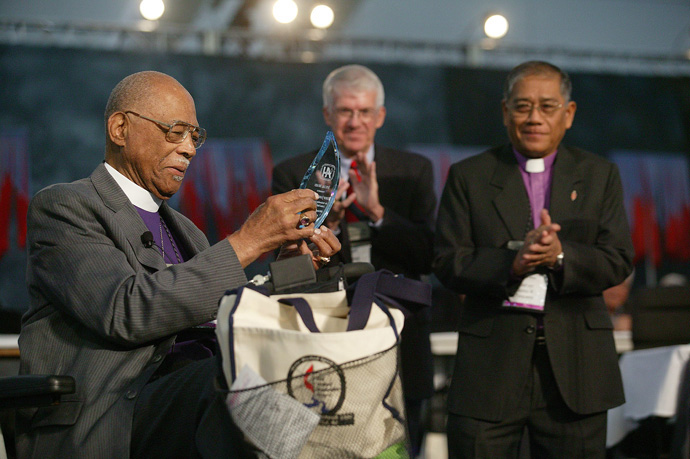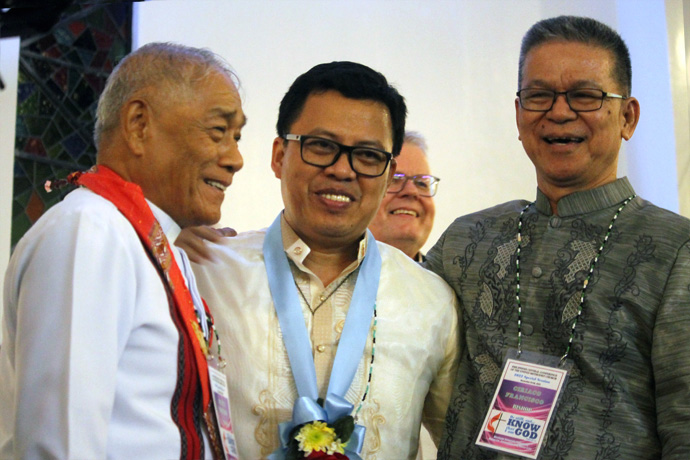December 6, 2023

Bishop Solito K. Toquero, who stood in solidarity with the oppressed and impoverished, died Dec. 1 in his sleep. He was 81.
“He was a prophet,” said retired Bishop Ciriaco Q. Francisco. “He spoke boldly, firmly and compassionately to protect the rights of the poor, the oppressed, the marginalized and the disadvantaged members of the society.”
Francisco said Toquero was never afraid to march in the street to denounce evil and corruption in government. “He was a strong defender of human rights and advocate of justice and long-lasting peace.”
Francisco said the bishop extended open arms to all.
“He welcomed everyone in the body of Christ and did not discriminate against anybody because of color, gender preferences, economic status or biblical and theological beliefs. He believed that the very nature of the church is inclusive, welcoming and a caring body of Christ.”

Called “Bishop Sol” by many, Toquero was born on May 31, 1942, in Canaan Rizal Nueva Ecija, Philippines. He earned his bachelor’s degree from Wesleyan University-Philippines, his Bachelor of Divinity degree from Union Theological Seminary-Philippines, and his Doctor of Ministry degree from Christian Theological Seminary in the U.S.
Toquero was elected to the episcopacy in 2001 and assigned to the Manila Episcopal Area. He was re-elected in 2004 and retired from the active episcopacy in 2008.
“The UMC lost a servant leader who stood for the truth and fought courageously for the rights of the marginalized,” said retired Bishop Rodolfo A. Juan.
“Bishop Sol was very soft-spoken but had a strong voice in the advocacies that he led.”
Toquero started his ministry with no formal training at age 19.
“My experience in attending and joining crusades and evangelistic services, doing house-to-house visitation, distributing tracts and personal evangelism with veteran local pastors and elders ushered me into the world of local mission,” Toquero said in a 2016 interview with Nova Villa Gutierrez Vitug-Thomas.
He said he felt God’s call to the ministry while studying in Manila at the College of Engineering of Mapua Institute of Technology.
“In Manila, I found myself worshiping with a small congregation, a Wesleyan group called Pilgrim Holiness Church, (with) a small garage as a worship center.”

Reading the Bible and Wesleyan materials was his source of wisdom.
“Even before I entered the ministry, as a youth, I began to read the Bible, reading chapters with reflection and prayer. I also read books written by John Wesley and the early Methodist leaders on Evangelism and winning souls,” Toquero said in the interview.
He said that an American Methodist missionary, the Rev. Richard Wehrman, lent him more books to read while he was doing his mission work, which he began in Kasiguran Aurora, a mountainous area, walking and crossing rivers. Before he was elected to the episcopacy, he served as a missionary in Hong Kong to Filipino migrant workers.
Phebe Crismo, executive secretary of the Philippines Board of Christian Education and Discipleship, said Toquero was her pastor at Francisco Homes United Methodist Church while he waited for his visa to Hong Kong.
“He served with us for only eight months, but long enough to touch our lives and inspire us to become better Christians. His humility, simplicity and deep spirituality and love for the church remain unequalled.”
The IBON Foundation, a nonprofit development organization in which Toquero served as chairperson of the board, issued a statement celebrating his ministry.
“His mission work writ large spanned the working classes of farmers, labor and urban poor, Indigenous peoples as well as political prisoners, and included advocacy to protect the environment and integrity of creation. He knew how so many issues were interconnected pieces of the same big problem.”
The National Council of Churches in the Philippines echoed its praise of Toquero’s commitment to the poor.
“Bishop Toquero was a beacon of light to poor and struggling communities and a strong and prophetic voice for institutions, churches and organizations where he served. As a true shepherd of God’s people, Bishop Toquero was ever-compassionate and ready to be of service to the people,” the council said in a statement.
Bishop Israel Painit of the Davao Area said Toquero was known for being a shepherd to the masses.
“Bishop Sol was not content with simply leading from a distance. He led a concerted effort to be present in the lives of the people he served, reaching to the grassroots of the church and community.
“(He was) a remarkable and progressive leader who touched the hearts of many through his humility, accessibility and of being a common fellow to all,” Painit said. “The bishop’s humility and warmth created an environment where everyone felt valued and heard.”
As a bishop, he offered an open table to celebrate the communion of church people with the whole nation, seeking and pushing for genuine change.
“He pursued his prophetic work not only with the power of spoken words but, more importantly and convincingly, the power of his lived life,” wrote Eleazer Fernandez, the former president of Union Theological Seminary, in a Facebook post.
“He tirelessly strove to walk his talk, which he did with a humble gait, leaving a trail of life-giving commitment never to abate. Even as he was passionate in his prophetic advocacy, he never allowed it to cloud his kindness and warm-heartedness.”
Bishop Rodel M. Acdal of the Baguio Area said that Toquero served God through his service to humanity.
“He served the people, especially the masses. Bishop Sol loved to tell stories and histories. Very fatherly to us young bishops,” said Acdal.
The Rev. Egmedio Equila Jr., from the South Nueva Ecija District, echoed those sentiments.
“The bishop for me was a father who cared for his children a lot. Simply whenever he saw you he would ask, ‘How are you?’ Your ministry? Your kids?’ A very caring father to every pastor and to my children, who fondly called him ‘Lolo (grandfather) Bishop.’ His arm was widely open to everyone who needed help.”
Deaconess Darlene Marquez-Caramanzana, the Asia liaison of the United Methodist Board of Global Ministries, said she was drawn closer to embracing the prophetic duty of her vocation as a deaconess thanks to Toquero.
“Living faith is found among the afflicted, disadvantaged and exploited. Bishop Sol lived with the saints, advocated their righteousness, rights and dignity, lived and traveled and embraced them without bias and pure love.”
The first female United Methodist bishop in the Philippines, Bishop Ruby-Nell Estrella of the Manila Area, expressed how the bishop has left his mark.
“On top of his prophetic witness and commendable, deep spirituality, he made sure that women were given a place in the church’s leadership. The bishop appointed me as the first clergywoman district superintendent.”
Minnie Anne Mata Calub, the general secretary of the National Council of Churches in the Philippines, said, “We will miss his captivating and wisdom-filled stories and impeccable smile.”
Bishop Toquero served as vice chair of the National Council of Churches from 2008 to 2011. He also served as president of the United Methodist Commission on Archives and History.
“In times of joy, sorrow and even chaos, Bishop Toquero stood by the people, offering solace, understanding and a comforting presence,” Calub said.
The Rev. Donald E. Messer, co-chair of the United Methodist Global AIDS Fund, said Toquero “had a global reputation for courageous compassion, speaking truth to power and standing in solidarity with the oppressed and impoverished.”
Retired Bishop Mary Ann Swenson shared a fond memory: “When I was in the Philippines, young people were playing music with bamboo sticks called Angklung. Bishop Toquero and I were invited to dance. Those funny moments made us laugh and we got closer. He was a wonderful man. He had a great sense of humor and wonderful smile and a twinkle in his eye. The church was blessed with his leadership.”
Bishop Carlo Rapanut of the Desert Southwest Conference said that Bishop Toquero “had a heart for connecting people, masterfully using his gift of storytelling to weave connections that turned strangers into friends.”
Rapanut said that “he was a humble leader who led without pretensions, drawing groups together by his calm demeanor and infectious smile. I consider it a blessing to have been part of the fabric that Bishop Sol wove together.”
The Rev. Liberato Bautista, assistant general secretary for United Nations and International Affairs at the United Methodist Board of Church and Society, said Toquero put other’s needs before his own.
“The number of people testifying to the influence of Bishop Sol on their lives and relationships, and direction in their ministry and advocacy for justice and peace, is a testament to the strength of character and moral fortitude of this unassuming human but a giant church leader and champion of the poor and oppressed.”
The bishop died in his sleep on his journey back from a United Methodist investiture ceremony, where he pronounced his last benediction. The president of Wesleyan University-Philippines, Dr. Irineo Alvaro Jr., remembered his firmness, humility and holiness.
“He hugged me so tight and whispered, ‘Congratulations. Go on with this journey.’”
Toquero’s survivors include children Ria and Tin, Mervin and Raquel, and granddaughters Awit, Himig and Sining.
A memorial service will be held at the Salakot Chapel, Union Theological Seminary, at 8 a.m. local time on Dec. 7, and interment will be at the Manila Memorial Park, Dasmarinas, Cavite.
Bishop Painit urged others to continue Toquero’s legacy in ministering to all.
“Let us carry forward the legacy of approachability, humility and genuine connection that Bishop Sol left behind,” he said.



